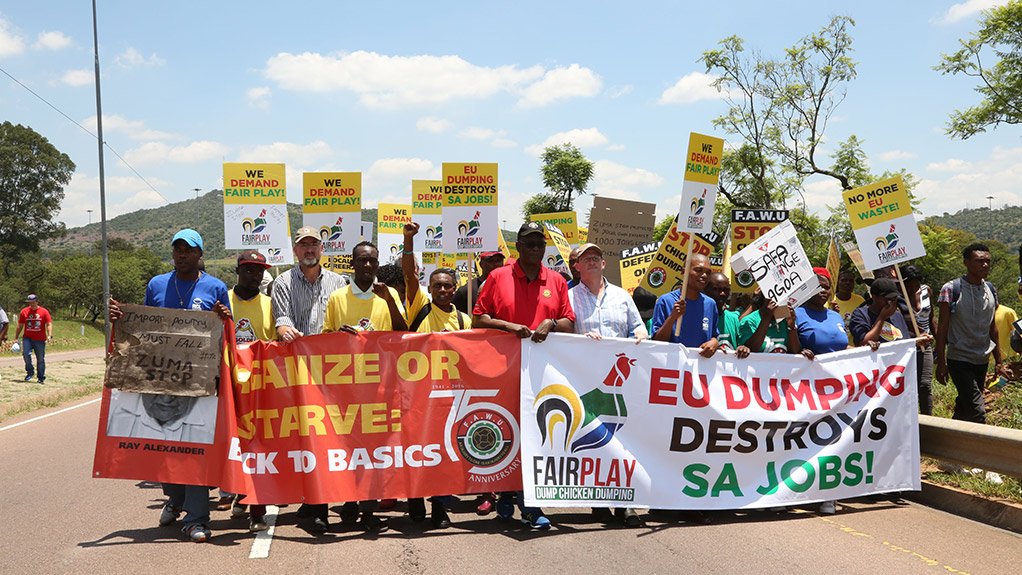Trade and Industry Minister Dr Rob Davies is adamant that government will not stand by while its poultry industry is “decimated”, but acknowledges that there are also issues of industry competitiveness that should be addressed.
Speaking this week during the Economic Sectors, Employment and Infrastructure Development Cluster briefing, Davies said the provisional safeguard introduced in December was in response to “abnormal” inflows of brown meat, which were undermining the domestic industry.
On December 15, the International Trade Administration Commission of South Africa (Itac) imposed a 13.9% provisional safeguard duty on frozen bone-in-chicken from the European Union (EU). The duty would remain in force for 200 days, until July 3.
He said the protection had been imposed in line with the recently ratified Economic Partnership Agreement between the EU and six Southern African countries, which entered into force in late 2016. Itac had also been requested to “come up with a longer-term figure by July on the level of the safeguard duty to be imposed”.
“Our overall objective, and we have said it very frankly to the EU, is that we are not going to see the local poultry industry decimated. We do acknowledge that there are issues of competitiveness that we have to address, and that’s why we have a task team in place. But we can’t allow the industry to be simply disappear as a result of this surge of imports, otherwise we won’t have an industry to raise the competitiveness of.”
The task team to which the Minister was referring was established in January with work-streams focusing on trade measures, health and quality issues, competitiveness, industry growth and transformation, as well as industrial financing, incentives and demand-side interventions.
EU Ambassador Marcus Cornaro has dismissed suggestions that European exporters are dumping bone-in chicken on to the South African market, noting that the prices of frozen chicken pieces from Spain, Belgium and Ireland are not the cheapest on the market. He stresses, too, that imports from seven other EU poultry exporting countries – Germany, the Netherlands, France, the UK, Poland, Hungary and Denmark – were currently prohibited, owing to an Avian flu ban imposed since late 2016.
“The aggregate impact is that exports of chicken from the EU to South Africa are down by one-third,” Cornaro argued recently, adding that the EU intended contesting the provisional duty imposed in December.
However, FairPlay, a movement established in October to “end the unlawful trade practice of dumping worldwide”, says it is prepared to intensify its advocacy in support the domestic poultry industry and the jobs its supports.
Founder Francois Baird, a well-known public relations practitioner, who recently retired as Africa chairperson of Edelman, told Engineering News Online that FairPlay’s support was not premised on protectionism or any antagonism towards free trade.
“Our strategy is to show that dumping is not importation, it’s not free trade and those good things – that’s not the beast. The beast is an illegal practice.”
The World Trade Organisation defines dumping as a situation of international price discrimination, whereby the price of a product, when sold in the importing country, is less than the price of that product in the market of the exporting country.
FairPlay participated in the recent protest march to the European Delegation in Pretoria, which was led by the Food and Allied Workers Union (Fawu) and the South African Poultry Association.
Following a special extended national executive committee (NEC) meeting on March 2, Fawu reiterated the negative impact “dumped” chicken imports from the EU were having on employment in the sector. It noted that RCL Foods’ chicken division had retrenched 1 350 workers, while other poultry companies had reduced hours of work.
“The NEC welcomed a sense of urgency and seriousness demonstrated by our government, following the protest marches to both the EU embassy and to the Department of Trade and Industry, and hope that the task team established will move with speed in crafting packages of intervention and government implementing the same to defend the industry from decimation or significant shrinkage,” the union said in a statement.
Baird stressed that, while FairPlay’s first campaign was focused on chicken, the organisation was independent and could, in future, turn its attention to unfair trade practices in other sectors, such as steel. He saw the movement as providing a platform for people to “work together” to opposed dumping.
“Our focus now is on building the alliances, is on driving home the message and helping to provide support where support is needed,” Baird explained, adding that its support could include offering backing for legal action.
Edited by: Creamer Media Reporter
EMAIL THIS ARTICLE SAVE THIS ARTICLE
ARTICLE ENQUIRY
To subscribe email subscriptions@creamermedia.co.za or click here
To advertise email advertising@creamermedia.co.za or click here













